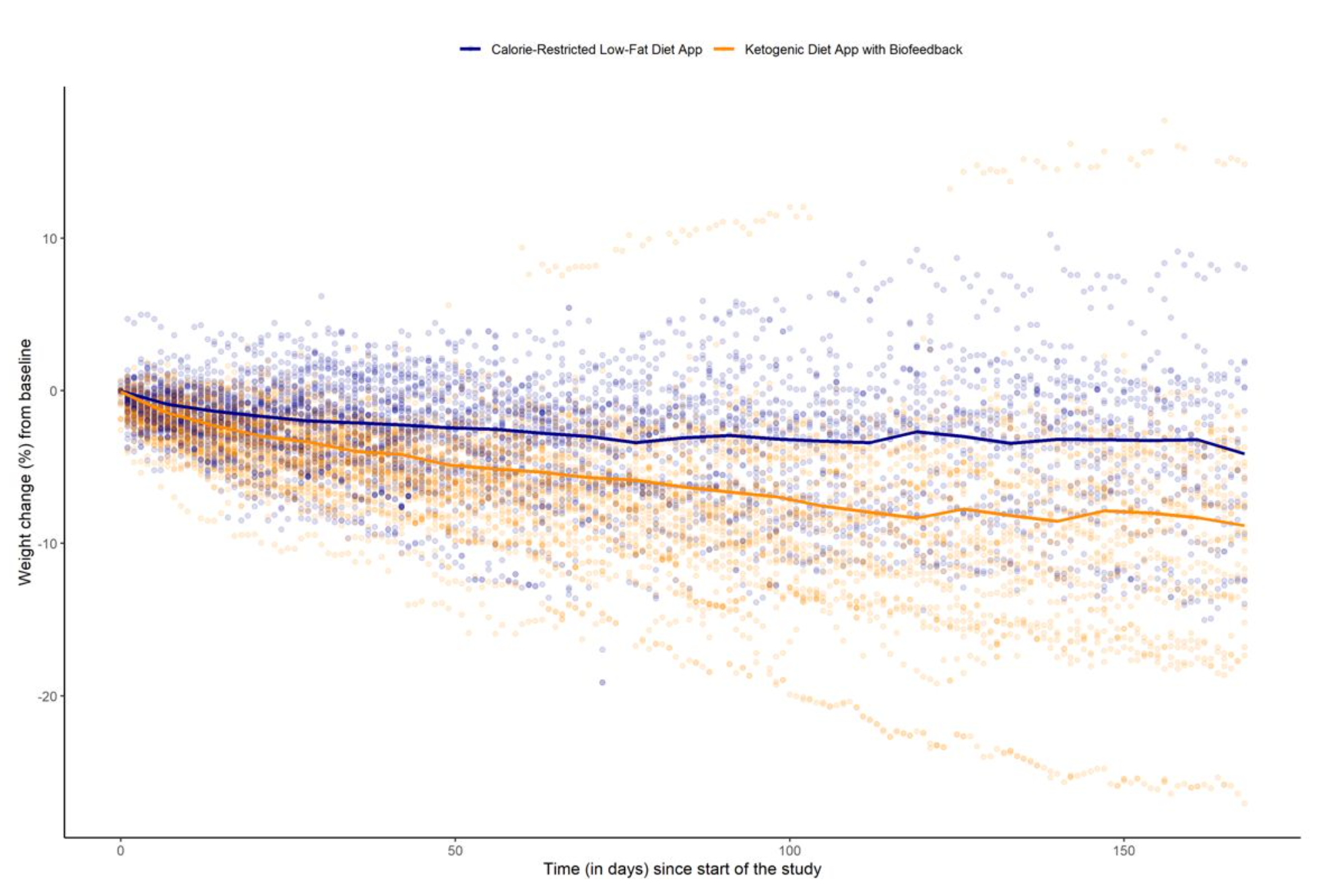In the previous posts, we’ve outlined how we designed the nutrition principles of the Keyto program, why RCTs are a gold standard test, and what is actually included in our program. In this post, we’ll discuss our RCT results.
As a recap, the objective of our RCT was to determine whether our Mediterranean-style ketogenic program was superior to the Weight Watchers’ (WW) calorie-restricted low-fat program in promoting weight loss. The study was conducted by the University of British Columbia.
Trial Design
155 participants that were overweight or obese were randomized to either Keyto or WW. Both interventions were delivered entirely via app. The average age of participants was 41 years old with an average BMI of 34 kg/m2. 71% of the participants were female. All participants received a wireless scale for recording weights. A third-party laboratory collected blood samples at baseline and 12 weeks.
Results
Weight loss at 12 weeks was greater for the Keyto group (-5.6 kg; 95% CI, -6.7 kg to -4.5 kg) compared to the WW group (-2.5 kg; 95% CI, -3.6 kg to -1.4 kg).
The between-group difference was a 3.1 kg greater weight loss for the Keyto group (95% CI, -4.6 kg to -1.5 kg; p < 0.001).
Going further, weight loss at 24 weeks showed the durability of the superiority of Keyto over WW. Keyto users lost 5.5 kg more than WW users (95% CI, -8.3 kg to -2.8 kg; p < 0.001). Notably, this weight loss represented 8.4% body weight in the Keyto group vs 2.9% in the WW group.

Beyond weight loss, secondary outcomes of HbA1c (a marker of blood sugar levels over the past three months) and ALT (a liver enzyme that’s a marker of damage in liver cells) were improved to a greater extent in the Keyto group (p < 0.01). This significant difference was maintained even after adjusting for weight loss, suggesting that the improvement seen in these markers in the Keyto group occurred at least partially independent of the weight loss.
There was no significant difference between Keyto or WW in changes in cholesterol levels. This proved that our Mediterranean-style program does not negatively impact LDL cholesterol.
Study authors’ conclusion
Among adults with overweight/obesity, the Keyto program was superior to the WW program at promoting weight loss in a real-world setting.
Our reaction
After learning about the results of the RCT (we were blinded to results until after all the data was analyzed by the study coordinators at UBC), our first reaction was relief.
The next emotion was excitement. Our intervention was proven to be more effective than WW for weight loss. We also showed a weight-independent improvement in diabetes markers and liver health. The latter was exciting as it provides evidence that a calorie is not just a calorie. To our knowledge, this was the first time this effect has been shown in consumer weight loss RCT.
We were also pleased that there was no significant difference between groups in changes in cholesterol levels. As discussed in previous posts, a primary objective when designing our program was to prevent any adverse effects on cholesterol.
Finally, participant survey data revealed that Keyto users improved sleep, had less hunger (more on this later), and rated Keyto as easier to follow when compared to WW users. Keyto users felt better with the changes they were making, and had more confidence the program was effective.
Note on COVID-19
This RCT began enrollment in January of 2020. Thus it was conducted through the peak of the COVID-19 pandemic, which was a monumental event in all of our lives.
In a survey added after COVID hit, Keyto users responded that they had less trouble with hunger, accessing food, and stress-eating due to the pandemic compared to WW users.
This was exciting as it meant our program was doable even through the most difficult conditions.
Next
The RCT proved the effectiveness of our Mediterranean-style keto program on weight loss, metabolic markers, without a negative impact on cholesterol. In the next post, we’ll dive deeper into the data, and discuss the implications of these findings.




